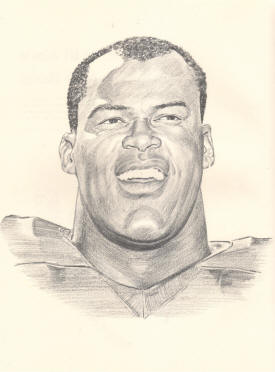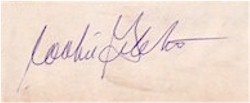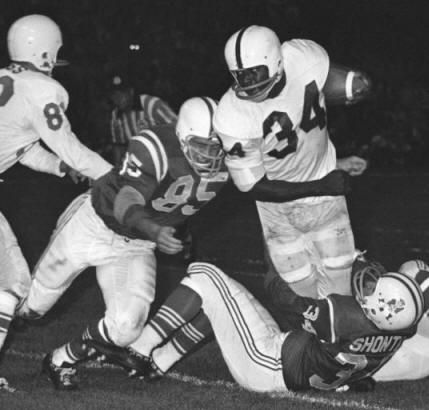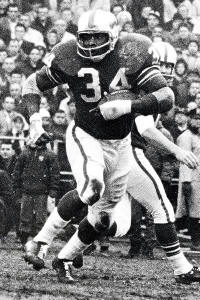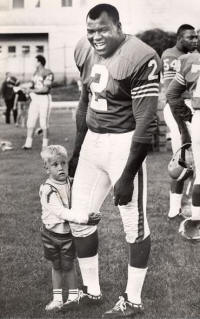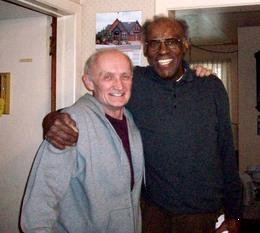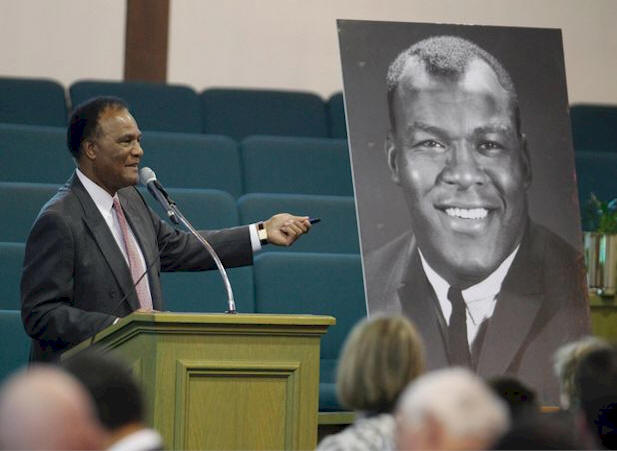Obituary: Carlton
Chester 'Cookie' Gilchrist / Outspoken,
Brackenridge-born star running back
[Webmaster's note: Cookie signed his name "Chester
Carlton Gilchrist", as seen in the
correspondence
HERE.]
May 25, 1935 - Jan. 10, 2011
By BILL
TOLAND
Pittsburgh Post-Gazette
|
|
|||||
|
|
|
|
|
||
| . | |||||
| . |
|
Chester Carlton 'Cookie' Gilchrist |
| . |
|
|
|
Pittsburgh Post Gazette |
|
|
|
Mr. Gilchrist, the Brackenridge-born runner who played for the American Football League's Buffalo Bills and in the Canadian Football League, died on Monday of cancer at Sterling House of Penn Hills, a personal care home. He was 75. "The Bills were very lucky to have procured the services of Cookie Gilchrist, who was one of the greatest fullbacks I have ever seen in all of my years in professional football," Buffalo Bills owner Ralph Wilson told The Associated Press. The two had reconciled in recent weeks after Mr. Gilchrist's condition was deemed terminal. At a playing weight of 251 pounds, Mr. Gilchrist often outweighed the linebackers trying to tackle him and the offensive linemen trying to block for him. His crashing style later led to comparisons with Mr. Brown, the Cleveland Browns' Hall of Fame back who was born the year after Mr. Gilchrist and played for the team that offered Mr. Gilchrist his first pro contract. It was a short-lived contract. The Browns signed him to a $5,500 deal in May 1954, while the young phenom was still attending Har-Brack High School in Natrona Heights. The previous fall, Har-Brack played Donora to a 0-0 tie in the WPIAL Class AA championship game. While Mr. Gilchrist was set to skip college -- he claims he was recruited by no fewer than 108 college football teams -- that pro deal violated National Football League rules at the time (at age 19, he was too young to play in the NFL), and the contract was voided. The Browns then offered him a new contract: $100 per game for a 12-game season. "I was raped, in public, by the Cleveland Browns. I've been the villain and scapegoat ever since," Mr. Gilchrist told Pittsburgh Post-Gazette reporter Milan Simonich in a 2003 profile. Instead of moving to Cleveland, Mr. Gilchrist was Canada-bound, playing six years for the Canadian Football League and a related league before joining the Bills in 1962. His first season in the AFL, he was named player of the year, rushing for 1,096 yards and 13 touchdowns. He helped lead the team, along with quarterback-turned-politician Jack Kemp, to two consecutive AFL titles, and he was a four-time AFL pro-bowl selection. Cornerback Booker Edgerson, a former Bills teammate, said Mr. Gilchrist was "just as good and maybe even better" than Mr. Brown. "He and Jim had the same outstanding abilities to play the game," he said, according to the AP. Mr. Gilchrist shared the same high opinion of himself: "I told Jim Brown to his face that if I had stayed with the Browns, nobody would have heard of him," he told the Post-Gazette. Following the 1964 season, having already clashed with his head coach in Buffalo, Lou Saban, Mr. Gilchrist cemented his reputation for boat-rocking -- and for civil rights engagement. In segregated New Orleans, Mr. Gilchrist (according to his own account) helped organize a player boycott of AFL East-West All-Star Game. Mr. Gilchrist was one of 21 black players selected to play in the game. But when white cabbies refused to drive Mr. Gilchrist and other black players into the city -- and after French Quarter businesses wouldn't let his black teammates in the doors -- he and others decided to boycott the event. Ron Mix, Hall of Fame tackle for the San Diego Chargers, befriended the running back as a result. "The truth is, New Orleans should erect a statue to Cookie," Mr. Mix said in the 2003 profile of Mr. Gilchrist. "The city wanted an NFL team, but it was not going to get it unless it desegregated. The boycott led to a change in the laws." And the AFL All-Star Game was moved to Houston. Mr. Gilchrist also turned down induction into the Canadian Football Hall of Fame, saying players were exploited by team management. In the years before his death, Mr. Gilchrist said he was writing a movie screenplay based on the New Orleans boycott; he also spent several years working on an autobiography manuscript. His Buffalo career ended after three seasons. After he wore out his welcome there, he was traded to the AFL's Denver Broncos and also played for the Miami Dolphins. Retired Buffalo News football writer Larry Felser wrote about Mr. Gilchrist during his days with the Bills and still regards him as the best to play the game. Mr. Felser wrote in 2004: "Any time. Any place. Any brand of football. Cookie was, pound for pound, the greatest all-around player I ever saw. He would be a superstar in today's football." After his 1967 season with the Broncos, the Cincinnati Bengals claimed Mr. Gilchrist in the league's expansion draft. The Bengals' coach and owner was Paul Brown, whom Mr. Gilchrist still had not forgiven since being "raped in public" by the Cleveland Browns. Mr. Gilchrist immediately retired. "No way was I ever going to play for him," Mr. Gilchrist said. One man for whom he might have considered playing was Steelers' owner Art Rooney. "He alone showed me more respect than any other white or black person," Mr. Gilchrist said in the 2003 profile. Mr. Gilchrist was born in Brackenridge to parents Otto and Rose, who had worked in steel mills along the Allegheny River. He was named after a black physician, Chester Harris. As a boy, Mr. Gilchrist said, he dreamed of being a doctor. The Rev. Darrell Knopp, pastor at McKeesport Presbyterian Church and a part-time hospice chaplain, met with Mr. Gilchrist several times over the last weeks of his life. He said the long-time recluse had come out of his self-exile over the last decade, "reconciling with a number of important people in his life after a period of estrangement" (including Mr. Wilson, the Bills' owner, whom Mr. Gilchrist partly blamed for getting rid of him following the 1964 season). Rev. Knopp said that Mr. Gilchrist spent his final hours making peace with family, friends and his own death. "I said, 'Cookie, you're coming to the end of the road. Are you ready?' He looked at me, and said, 'Yes, I'm ready.' " And then he began to cry. Mr. Gilchrist is survived by sons Jeffrey and Scott and daughter Christina Gilchrist, all of Toronto, and two grandchildren. Visitation will be held from 2 to 4 p.m. and 7 to 9 p.m. Wednesday at the Ross G. Walker Funeral home in New Kensington, where a funeral will be held at 10 a.m. Thursday. btoland@post-gazette.com |
. |
|
The New York Times |
|
|
|
Cookie
Gilchrist, Early Star of the A.F.L.,
Dies at 75
By RICHARD GOLDSTEIN Cookie Gilchrist, the Buffalo Bills’ hard-charging fullback who became one of the early stars of the American Football League, died Monday in Pittsburgh. He was 75.
His death, at an assisted-living center,
was announced by the Bills, who said he
had cancer.
When he was playing in the Canadian Football League in the 1950s, Gilchrist owned a company that installed industrial lighting and trumpeted it with trucks emblazoned “Lookie, Lookie, Here Comes Cookie.” He was hardly likely to go unnoticed. At 6 feet 3 inches and 250 pounds or so, Gilchrist was an uncommonly awesome running back for his era, and he was an outspoken figure off the field. He was often involved in contract disputes with management, and he helped lead a boycott threat by black players over discriminatory treatment in New Orleans when they arrived there for the A.F.L. All-Star Game after the 1964 season, forcing the league to transfer the game to Houston.
Joining
the
Bills in
1962,
the
A.F.L.’s
third
season,
Gilchrist
ran for
1,096
yards
in 14
games
and was
named
the
league’s
player
of the
year. He
set a
professional
football
single-game
rushing
record,
since
broken,
when he
ran for
243
yards
and 5
touchdowns
against
the Jets
in
December
1963.
Gilchrist led the A.F.L. in rushing again in 1964, his final season with the Bills, when he helped take them to the league championship. He was named All-Pro every season from 1962 to 1965. “Whoever’d run up, he’d run at him and then run over him,” his former Bills teammate Booker Edgerson, a defensive back, told Jeff Miller in “Going Long,” a history of the A.F.L. “A lot of guys said, ‘Why don’t you sidestep and run around?’ He said: ‘I want to teach them a lesson. If I run over ’em, they won’t come up anymore.’ ”
Carlton Chester Gilchrist was born in Brackenridge, Pa., on May 25, 1935, and was nicknamed Cookie as a child. After high school, he played in Canada, starring for the Hamilton Tiger-Cats, the Saskatchewan Roughriders and the Toronto Argonauts before joining the Bills.
He is survived by two sons, Jeffery and Scott, and a daughter, Christina Gilchrist, all of Toronto, and two grandchildren. Gilchrist was among the A.F.L. players who were refused service by restaurants, nightclubs and taxis while preparing for the All-Star Game in New Orleans after the 1964 season. He was a leading voice among players whose boycott threat caused the shift to Houston. “He came to maturity at a time that coincided with the civil rights movement,” the former Bills quarterback Jack Kemp told Mr. Miller for his A.F.L. history. “And Cookie was a very proud guy. He didn’t take any guff from anybody.” After three seasons with the Bills, Gilchrist had two stints with the Denver Broncos and also played for the Miami Dolphins. He retired after the 1967 season, having run for 37 touchdowns and 4,293 yards. In 1983, when he was nominated for induction into the Canadian Football Hall of Fame, he turned the honor down over his feelings that he had faced racism. “Cookie was the Jim Brown of the American Football League; he was the icon of the league,” Edgerson told The New York Times in 1994. “But the biggest thing about Cookie is that Cookie did not take any mess off of anyone. That’s his legacy.” |
. |
. |
| Cookie
Gilchrist rumbled right until the end By Tim Graham For those of you unfamiliar with what Cookie Gilchrist was all about, Paul Maguire has a story to share. It was December 1964. While snow was being cleared from Fenway Park's field, the Buffalo Bills waited anxiously in a spartan locker room for their game against the Boston Patriots to start. They normally would've whiled away this time with card games or other diversions to ease the mood. Not on that day. The Bills had to win to host the AFL Championship game six days later. The atmosphere was tense, the room quiet. "Cookie stood up," Maguire recalled, "and said 'I'm going to tell you something. If we don't win this game, I'm going to beat the s--- out of everybody in this locker room.' " Just then, Bills head coach Lou Saban and assistants Joe Collier, Jerry Smith and John Mazur unwittingly walked into their star fullback's escalating fury. |
|
Maguire continued: "Cookie pointed and said, 'And I'm going to start with you, Coach. I'm going to kick your ass first.' I just sat back in my locker. I knew he meant it." On the first play of the game, Gilchrist took a handoff from Jack Kemp and trucked helpless Patriots safety Chuck Shonta. "Cookie ran right over his ass," said Maguire, the Bills' popular linebacker and punter. "Then he went up to Bob Dee, who was the defensive end, and says 'You're next.' Kemp came over the sideline and said 'We've got to get him out of there. He's going to kill somebody.' " The Bills pummeled the Patriots and then shocked the San Diego Chargers to win their first of back-to-back AFL titles. "He had so much character he brought out the best in all of us," Bills tight end Charley Ferguson said. "If there's ever such a thing as 110 percent, that's what you got from Cookie. There was no such thing as not being ready." |
|
| Carlton Chester "Cookie" Gilchrist
died Monday morning in a Pittsburgh assisted living facility. Cancer finally caught him at 75 years old, but not before he broke another tackle. Gilchrist's hospice nurse found him dead in a chair Saturday. She phoned his great nephew with the somber news. Thomas Gilchrist arrived and saw his uncle slumped over. Nurses prepared Cookie's bed for him to be laid down one last time. Thomas carried his uncle's 140-pound body from the chair. And then Cookie woke up. "He was dead in the chair," Thomas Gilchrist said. "And 30 minutes later he was drinking a root beer with me." Cookie Gilchrist's family and teammates were laughing at the thought Monday. It was symbolic of how he was: rugged, stubborn and usually unbeatable. Gilchrist often is overlooked among the game's great running backs because his career was brief and his relationships strained. Ferguson, who also played with Jim Brown and O.J. Simpson, called Gilchrist "one of the greatest backs to ever play the game." "These young guys didn't have more of an opportunity to learn about Cookie and see him in action," Ferguson said while mourning at former Bills teammate Booker Edgerson's home in suburban Buffalo. "They may have heard something, may have heard very little, but if they ever had that kind of opportunity it would have meant something to them." Gilchrist went straight from Har-Brack High School in the Pittsburgh area to the Canadian Football League, where he starred for six years. He played fullback, linebacker and kicked field goals for Hamilton, Saskatchewan and Toronto before he returned stateside with Buffalo. He played only six seasons in the AFL, but they were brilliant. He's the fullback on the all-time AFL team. In 1962, he became the first AFL back to rush for more than 1,000 yards and also kicked eight field goals and 14 extra points for Buffalo. In each of his first four seasons, he was an All-Star and led the league in rushing touchdowns. He spent three years with the Bills and one with the Miami Dolphins sandwiched between year-long stays with the Denver Broncos. "He was so impressive," Maguire said. "He was the biggest fullback in the game and could run and block. When he first came to the Bills he was the wedge buster. "On the football field, he was one of the nastiest sons a bitches I ever met in my life. There was absolutely no fear in that man." Gilchrist's 31 rushing touchdowns (in just three seasons) still rank third in Buffalo behind only Simpson and Thurman Thomas. Gilchrist set single-game records with 243 yards and five touchdowns against the New York Jets in 1963. Gilchrist was a battering ram on the field, but so headstrong that he gave coaches and administrators headaches. He engaged in several disputes with Saban and Bills owner Ralph Wilson. One of the pivotal moments came in Buffalo's first game against Boston in 1964, a War Memorial Stadium shootout between Kemp and Babe Parilli that didn't involve much running. "The offense got the ball and he didn't go into the game," former Bills tight end Ernie Warlick recalled. "Saban asked 'Hey, Cookie, why aren't you out there?' He said 'They're not giving me the ball, so why the hell should I play?' So he sat on the bench and told his backup [Willie Ross] to go in." The Bills placed Gilchrist on waivers after that episode, but Kemp brokered a reconciliation. The club pulled him back for the rest of the campaign. The Bills traded him to Denver in the offseason for Billy Joe. "He jumped off the curb every once in a while," Warlick said, "but he was with them team almost 100 percent." Gilchrist was among a group of black players who boycotted the AFL All-Star game over racist treatment in New Orleans. The game was moved to Houston. He turned down induction into the CFL Hall of Fame, citing bigotry. "He was very outspoken," said Edgerson, a Bills cornerback for eight seasons. "He understood the economics and the monetary value of a player. He expressed himself, and that got him in trouble a lot. "But the things he did back in the 1960s was mild compared to what these guys do today. There is no way in the world he would be considered a bad boy today." The Bills waived Gilchrist during the 1964 season because of his contract demands. "I wanted a percentage of the hot dog sales, the popcorn, the parking and the ticket sales," Gilchrist said in a 2007 interview with the Pittsburgh Tribune-Review. "[Saban] said that would make me part owner of the team. I was a marked man after that." Those familiar with the selection process claim Wilson has long refused to consider Gilchrist for the team's Wall of Fame. Gilchrist and Wilson didn't mend their fractured relationship until a phone conversation last week, Thomas Gilchrist said. Wilson also had a lifelong feud with Saban, the only coach to win a championship for Buffalo, let alone two. Saban, who died in March 2009, isn't on the Wall of Fame either. "It's very sad that it couldn't be patched sooner," said Edgerson, added to the Wall of Fame in October. "It doesn't make any difference whose fault it is, or who didn't come to the table. Obviously, it was bad blood because they have not been put up on the Wall, and everybody believes that they should have been regardless." Said Warlick: "It is a shame that those two guys are not even considered to go on the Wall. It's really too bad because they both should be there." What makes Gilchrist's absence on the Wall of Fame even more disappointing is that players such as him -- stars that burned brightly but briefly -- aren't properly appreciated, particularly by younger generations. Those who watched Gilchrist play know how special he was. "Anybody from that era would never forget him," Maguire said. "He was that kind of a guy. When you went on the field with him, you never even doubted that you were going to win because he wouldn't let you think any other way." Gilchrist is survived by sons Jeffrey and Scott and daughter Christina Gilchrist and two grandchildren. Calling hours will be held Wednesday at Ross G. Walker Funeral home in New Kensington, Pa. Funeral services will be Thursday. Thomas Gilchrist asked that any regards be sent to 322 Mall Blvd. Suite 164, Monroeville, Pa. 15146. |
|
. |
|
|
|
|
|
Former Argos star Cookie Gilchrist dies
By Steve Simmons Every sports writer has a bucket list of events they’ve never covered, cities they’ve never been to, people they’ve never interviewed. Cookie Gilchrist was always high on my list of people I had to interview. I called him more than once. I left messages. I talked to people who said they knew him and asked if they could arrange something. Almost every time I went to Pittsburgh, whether it be for a Penguins game or a Steelers game, I’d often think of getting a rental car and driving out to interview the man my late father insisted was the greatest football player he ever saw. We never did connect — and the greatest player my dad ever saw succumbed to throat cancer Monday at the age of 75 on Monday, with a unpublished autobiography, a movie never made, and a football life so rich, so troubled, so complex that it is almost impossible to explain the man in any kind of modern context, the man who once drove a drove a truck around Toronto with the words “Lookie, Lookie, here comes Cookie” on it . “I told Jim Brown to his face that if I stayed with the Browns, nobody would have heard of him,” Gilchrist said in a rare interview with the Pittsburgh Post-Gazette in 2003. “And that’s Cookie,” said Jim Rountree, his former Argos teammate. “He wasn’t just good. He was great.” He played running back, fullback, middle linebacker, cornerback, nose tackle, punted, kicked field goals depending on the game and the circumstance, the kind of football player we don’t see anymore in an age of specialization. “There wasn’t anything he couldn’t do,” said Rountree, although Gilchrist disagreed. Cookie once said he would have played quarterback too if he could have found a way to throw the ball to himself. Cookie Gilchrist grew up in an America that no longer exists, with more racism and less sporting structure, spurning 108 college scholarship offers to sign an unheard of National Football League contract with the Cleveland Browns. High school players didn’t go directly to the NFL and until the deal was disallowed and the rules changed, Gilchrist had a brief and unhappy stay at an American university before finding his way to Canada. “I was raped in public by the Cleveland Browns. I’ve been the villain and scapegoat ever since,” said Gilchrist in 2003. He first ran the ball for the Sarnia Imperials of the Ontario Rugby Football Union and later for Kitchener Waterloo Dutchmen. Then one CFL year in Hamilton. One year in Saskatchewan. Three years with the Argos. Long enough to be voted in to the Canadian Football Hall of Fame. Voted in but never enshrined. The story has gone around for years that Gilchrist refused to be part of the white establishment and would not agree to be inducted in the Canadian Hall. Gilchrist told a different version to my QMI Agency colleague, Earl McRae, in a series of e-mails exchanged last January. “I never turned down the Hall of Fame,” he wrote. “When John Agro told me to be nice to (commissioner) Jake Gaudaur when he told me I was nominated to be inducted, I told him I would take that under advisement.” Gilchrist claimed his induction was reneged upon after that — and Leo Cahill, for one, believes the CFL Hall erred in never trying to induct Cookie again. “From what I understood, he would have gone in happily. He might have been angry at he time but he loved his time in Canada.” “I loved Canada and the Canadian people,” Gilchrist wrote. “However Canada does not love Cookie Gilchrist.” Much as they appreciated his talent, there were things about Gilchrist that didn’t enamour the Argos and after the 1961 season the decision was made to trade him. Only one problem. Gilchrist had, if you can believe this, a no-trade clause in his contract. When the Argos attempted to deal him, they voided his contract. Two teams with CFL connections, the Buffalo Bills of the AFL and the Los Angeles Rams of the NFL were very interested. So much so that a Bills assistant coach named Harvey Johnson drove up to Toronto and signed him to play for Buffalo. And oh, did he play. In three seasons in Buffalo, he rushed for 3,056 yards (14-game seasons), scored 34 touchdowns in 42 games, won an MVP award, a league championship for the Bills. And today, there is an NFL team in New Orleans, probably because of what Gilchrist started in the 1965 AFL all-star game. The game was scheduled for New Orleans at a time of racial intolerance. The 20 black players in the AFL all-star game were promised there would be no trouble, But upon arrival in New Orleans, cab drivers refused to take black players from the airport. As the week went on, black players were denied service in hotels, restaurants and clubs until Art Powell of the Oakland Raiders called a meeting and in the meeting Gilchrist took over. The players voted to boycott the game. The AFL had no choice. They moved the game to Houston, embarrassing New Orleans, which was in search of an NFL franchise. The football boycott essentially led to desegregation in New Orleans, which led to the awarding of an NFL franchise. “The boycott was nonviolent, non-praying, non-singing, and non-begging, which was what black people always did,” Gilchrist said in 2003. But it was pure Cookie: Strong, opinionated, principled. “He was one tough Cookie,” said Nick Volpe, who coached against him in the ORFU. “There wasn’t anyone like him, then or now.” |
|
THE KANSAS CITY
STAR |
|
Former AFL star Cookie Gilchrist dies at 75 Star News Services
Cookie Gilchrist was a 251-pound bruiser whose ferocious running style drew comparisons to that of the great Jim Brown, and Gilchrist’s grit and single-mindedness extended beyond the football field. Gilchrist took stands against racism and wasn’t afraid to demand better contracts. He died early Monday of cancer at age 75 at an assisted-living facility near Pittsburgh, nephew Thomas Gilchrist said. Cookie Gilchrist was first diagnosed with throat cancer, and the disease spread to his prostate and colon. Carlton Chester “Cookie” Gilchrist joined the Buffalo Bills in 1962 and was AFL player of the year that season. Gilchrist, who also played for Denver and Miami in his six-year career, led the AFL in rushing in 1962 and 1964. Before joining the Bills, Gilchrist spent six years in the Canadian Football League, where he was regarded as one of its top two-way players. Former Chiefs coach Marty Schottenheimer,whoplayed in the AFL during 1965-70, remembered taking on Gilchrist. “I tried to rush the passer once, and he about broke my neck,” Schottenheimer said. “He was a monster.” |
|
Denver Post |
|
|
OBITUARY Gilchrist was ex-Broncos, early AFL star By Irv Moss The Denver Post |
|
|
When Carlton Chester
"Cookie" Gilchrist came to Denver for the 1965 season to play for the
Broncos of the American Football League, he was one of the shining stars
of the league.
He and coach Lou Saban had just won consecutive league titles for the Buffalo Bills, and Gilchrist arrived in Denver with much fanfare and promise that he would turn the team's running game into a force. He played for coach Mac Speedie and led the Broncos in rushing with 954 yards and six touchdowns. But the Broncos didn't have much success, finishing 4-10. Red Miller was Denver's offensive line coach for the 1965 season, and he coached at Buffalo during Gilchrist's heyday. It was announced Monday in Buffalo, N.Y., that Gilchrist, 75, has died of colon and prostate cancer. "I was the reason he came to Denver," Miller said of Gilchrist. "I went to the ownership and Mac Speedie and told them they could get a terrific player if they wanted him. He was a great friend. I'm sad to hear he died." Larry Felser, a retired Buffalo News football writer, wrote in 2004: "Any time. Any place. Any brand of football, Cookie was pound for pound the greatest all-around player I ever saw. He would be a superstar in today's football." Gilchrist came to the Broncos from Buffalo in a trade for running back Billy Joe. |
|
|
Gilchrist was traded after one season to Miami for tackle Mike Current and running back Fran Lynch. In 1967, Gilchrist returned to the Broncos to play for Saban but managed only 21 yards on 10 carries. Gilchrist, who took stands against racism and was known for demanding better contracts, entered pro football out of high school. He played in Canada for six years before joining the Bills. He was the AFL's MVP in 1962, when he ran for 1,096 yards and 13 TDs. Services are scheduled for Thursday in New Kensington, Pa. |
|
|
The Buffalo News |
Cookie was a
Monster on
the Field, a
friend off
it
Stubborn,
lovable,
intractable
and generous
are just a
few of the
words
|
|
|
|
|
Remembering Cookie by LARRY SCHOLTIS |
|
|
KITCHENER — The year was 1955 and Lublin’s Fruit Market stood
near the corner of Fairview Avenue and King Street East in
Kitchener. My mother, Betty, worked there part time, trying to
help her husband, Walter, pay the $11,500 mortgage on our
family’s new home on Chelsea Road.
A young man entered the store and said hello to Betty. She had
seen him several times before and knew that he lived across the
street in a boarding house. His name was Cookie and he was
handsome with a perpetual smile, six feet, three inches tall and
solidly built at 200-plus pounds.
Betty soon learned that Cookie bought fruit each day at Lublin’s
because the lady who ran his boarding house was a bad cook and
that left him hungry. He played football for the
Kitchener-Waterloo Dutchmen of the Ontario Rugby Football Union
and wanted to find a better place to stay.
Betty came home that afternoon and asked Walter if they could
take in a boarder to help cover their expenses. Two days later,
Carlton Chester (Cookie) Gilchrist, a future star with the
Buffalo Bills, arrived at our home. He agreed to pay $15 a week
for room and board.
I was eight then and my sister Linda was six. Cookie became
something like our big brother.
Fortunately for him, my mom was an excellent cook. Years later
Cookie would joke that he probably ate $25 worth of food a week
— and that was a lot in those days.
|
|
|
I would sit in the
kitchen with him,
eating chocolate
cake and talking
about life, school
and football. We had
a shared passion for
chocolate cake and
my mother perfected
them so they were
just the way Cookie
and I liked — two
layers with jam in
between and a thick
layer of chocolate
icing all over.
Years later when
Cookie surprised us
with a visit, he
went directly to the
fridge and pulled
out a chocolate cake
my mom had baked
just a few hours
earlier.
Cookie was born May
25, 1935, in
Brackenridge, Penn.
His mom, Rose,
nicknamed him
Cupcake as a child;
his dad, Otto,
called him Doughnut.
They eventually
decided on Cookie.
He was a high school
football star in
Natrona Heights,
Pa., when Paul
Brown, coach of the
Cleveland Browns,
signed him to a pro
contract in the
spring of 1954. This
was a violation of
National Football
League rules,
however, because at
19, he was too
young.
Cookie felt
betrayed. The
contract was voided
and this also voided
the 108 offers he
had received from
university football
teams. That’s how he
wound up in Ontario
in the summer of
1954, playing for
the Sarnia Imperials
of the Ontario Rugby
Football Union.
Canada was unlike
the United States,
where racial
tensions were
building and where
black Americans were
soon to challenge
the old ways and
make history.
In 1953, my mom took
my sister and I to
New Jersey by train
to visit relatives.
We had a stopover at
Grand Central
Station in New York
City. I walked to
the washroom and
looked up to see the
sign over the
entrance that read,
“No Colored.” I was
only six years old,
but I knew it was
not right.
The Dutchmen would
let Cookie, who
played fullback,
drive their car to
promote the team. It
had a giant
Styrofoam-like
football on top and
was painted in the
Dutchmen’s green and
white colours.
Cookie would stop in
front of Smithson
Public School, near
Krug Street in the
Rosemount area, to
give my sister and I
a ride home, even
though we lived only
one block from the
school.
We were like
celebrities because
of Cookie. He would
referee football
scrimmages on our
front lawn after
coming home from his
practices, then hand
out apples to the
kids when we
finished.
My dad would take me
to Dutchmen home
games with tickets
for seats at the
50-yard line that
Cookie always
obtained for us. The
team played in a
stadium that was
located roughly
where the old city
hall clock tower now
stands in Victoria
Park.
I would count the
number of tacklers
trying to stop
Cookie and later
give him my analysis
of his play over
chocolate cake and
milk. He won the
Dutchmen’s most
valuable player
award for that 1955
season, which
complemented the
trophy he had
received as the most
valuable player with
the Sarnia Imperials
the year before.
A lady friend of
Cookie’s was very
persistent with many
phone calls and once
came to our house
looking for him. My
mom knew he didn’t
want the lady
bothering him so she
answered the door.
The girl refused to
go away and it ended
with my mom chasing
her down the street.
Linda and I watched
and laughed with
Cookie as we peeked
through the blinds.
Kitchener had a
population of about
35,000 in 1955 and
it was rare to see a
black person at that
time. I remember
that Cookie came
home one day and
told us he had been
downtown and that a
Mennonite lady had
stopped him on the
sidewalk, reached
for his arm and
rubbed the back of
his hand. She was
expecting his colour
to come off and was
amazed it did not.
In 1956, Cookie
joined the Hamilton
Tiger-Cats and in
1957 he helped them
win the Grey Cup.
When he carried the
ball he ran over
people instead of
going around.
Angelo Mosca, a CFL
legend with the
Tiger-Cats, compared
the 250-pound Cookie
to a train coming
through the
defensive line.
Cookie later played
for the Saskatchewan
Roughriders and
spent three seasons
with the Toronto
Argonauts. For the
1962 season he moved
to the Buffalo Bills
of the American
Football League,
where he continued
to excel. He played
just three years
with Buffalo, but
today remains the
team’s seventh
leading all-time
rusher.
Cookie also played
for the Denver
Broncos and the
Miami Dolphins of
the American
Football League,
which merged with
the National
Football League in
1969 to form today’s
National Football
League. The Denver
Police Department
gave Cookie a badge
in appreciation
after he calmed a
group of potential
rioters on the
streets of the
Colorado city. His
football
achievements and
life story are well
documented on the
internet.
Cookie lived with
our family in
Kitchener for just
one season, but he
would phone or visit
whenever he could
after that. We would
listen to his pro
games on the radio
or watch him on
television.
On one occasion he
visited with his
wife Gwen and their
young sons, Scott
and Jeffrey. We had
a dinner prepared by
my mother, then
Linda and I took the
boys to a nearby
park where they
played and caught
fireflies.
I remember another
time when he phoned
my parents one
evening from
California, telling
them to watch an
upcoming episode of
The Beverly
Hillbillies in which
he had made his
acting debut. On one
of his visits I was
proud to show him my
photo as a member of
the senior football
team in the
Kitchener-Waterloo
Collegiate yearbook
and he autographed
the page for me.
Sometimes he would
bring a teammate or
two when he visited
and they were
treated to a
home-cooked meal and
my parents’
hospitality. He had
great respect and
admiration for
Walter and Betty,
who had taken him in
during the 1950s as
if he was their son
and continued to
treat him that way.
When visiting my
parents, he always
said he was “back
home.” Kitchener was
always a special
place for him.
I later lived in
Toronto for 32 years
and Cookie would
phone or drop by
there to see me,
sometimes with
teammates or with
other friends.
In 1963, Cookie
joined Dr. Martin
Luther King Jr. in
the famous March on
Washington for Jobs
and Freedom. He was
accompanied by the
singer Diana Ross on
one arm and an
actress on the
other. He was
honoured many years
later when his name
was mentioned in a
Nov. 10, 2008
article titled Here
Are The People That
Obama Can Now Thank,
written by Andy
Dabilis, managing
editor of the New
Europe, a weekly
news journal. It
listed the names of
many people who had
contributed to the
U.S. civil rights
movement over the
years.
During a visit to
Kitchener in 1965,
Cookie described to
us how earlier that
year he had led his
black teammates in
boycotting New
Orleans as the site
for the American
Football League
All-Star game, being
held to honour the
top players of the
1964 season.
On his arrival in
New Orleans for the
game, he told us, he
had tried to wave
over an airport
cabbie for a ride to
his hotel. When the
driver, a white
male, didn’t
respond, Cookie
walked over to the
cabbie to ask him
why. The driver
didn’t say a word,
but pointed to the
cabs with black
drivers.
In a locker-room
meeting, other black
players told similar
stories about being
refused service in
New Orleans
restaurants, hotels
and bars. Cookie
rallied them to
boycott the city
because of the
treatment they were
receiving. The U.S.
Civil Rights Act of
1964 had recently
been passed, which
encouraged black and
white players alike
to support the
boycott.
As a result, the
game took place the
next weekend in
Houston,
embarrassing New
Orleans which was
seeking a National
Football League
franchise at the
time.
This was an early
civil rights victory
for black athletes.
Soon after, the
Super Bowl was
created and I
believe the boycott
was a factor in its
creation — so that
team owners and the
league could ensure
that control was in
their hands and not
with the players.
Cookie’s many
conflicts with team
owners and coaches
over the years
resulted when he
spoke out instead of
remaining silent, as
black athletes were
expected to do in
those years. He was
not afraid to voice
his concerns. He
left his mark in
both the record
books and in
American history.
It has been reported
Cookie turned down
induction to the
Canadian Football
League Hall of Fame
in Hamilton. But he
told me he never
actually said no to
being inducted.
John Agro, then
counsel for Canadian
Football League
Players Association,
had informed Cookie
about his nomination
to the hall, then
told him to be nice
to Jake Gaudar, then
commissioner of the
league. Cookie said
he would take it
“under advisement”
because of his
strained
relationship with
Gaudar. Today, the
hall of fame is
missing one of
game’s greatest
players and
continues to
embarrass itself by
not inducting him.
Today’s younger
generations do not
know about Carlton
Chester (Cookie)
Gilchrist. I
consider myself
fortunate to have
known him. I admire
and respect him
because he lived his
life standing up for
his beliefs — and
doing so in a time
when being coloured
meant you were often
denied basic rights
that most of us take
for granted. And I
sometimes wonder
what kind of
football and
financial rewards he
could have achieved
were he playing
today.
I saw Cookie in 2008
when he was in
Kitchener to work on
a personal project.
During his stay he
went to visit Bobby
Kuntz, his old
friend and teammate
from his days with
the Dutchmen, but
Bobby was too ill.
Kuntz, who died on
Feb. 7 this year,
was the toughest
player he knew,
Cookie said.
Cookie himself was
now 73 and had
survived a fight
with throat cancer
just over a year
earlier. He had lost
a lot of weight and
was walking
unsteadily on legs
that had once
powered him through
defensive lines. But
his memory of names
and past events was
sharp. His smile was
as big as always and
his voice was again
powerful.
After dinner one
evening at my home,
Cookie and I, along
with my youngest
daughter, Larissa,
enjoyed a chocolate
cake for dessert. I
encouraged him to
finish writing his
autobiography, which
would document his
life and experiences
on and off the
playing field. In
March 2009 he phoned
my parents and
mentioned he was
working on the book.
After a visit that
summer he returned
to Pennsylvania. I
did not know it
would be the last
time I would see
him.
Cookie was a
resident in an
assisted living
facility outside of
Pittsburgh when he
died early this
year. His nephew,
Thomas Gilchrist,
told reporters that
on Saturday, Jan. 8,
a nurse at the
residence found
Cookie, now 75,
sitting in a chair
and appearing
lifeless. When
Thomas arrived at
the residence, he
lifted the 140-pound
Cookie from the
chair to place him
on a bed.
Suddenly then,
Cookie came to life!
He and Thomas shared
a root beer. Two
days later, however,
Cookie died from the
cancer that had
spread through his
body.
My mother, who is
now in a nursing
home, cried when my
dad told her of his
passing.
It was if Cookie had
tried to gain a few
more yards of life
when death tackled
him a second time to
finally bring him
down.
Larry Scholtis is
a Kitchener
resident.
|
|
|
The Buffalo News |
Gilchrist called 'real man'
|
|
|
|
Former Buffalo Bills great
Cookie Gilchrist was
remembered as a
larger-than-life character
both on and off the football
field during a memorial
service Saturday.
"Lookie, lookie, here comes Cookie!" said New York State Senior Appellate Justice Samuel L. Green, a longtime friend of Gilchrist's. "Those words reverberated off the walls of the old Rockpile." Gilchrist died in January at age 75 in Pittsburgh after a lengthy battle with cancer. Even though he played in Buffalo for only three seasons, from 1962 to 1964, his legacy looms large in Western New York because he was the Bills' first superstar. About 70 family members, friends and fans gathered for the service at St. John Baptist Church. At 6-foot-3 and 251 pounds, Gilchrist was a rare talent. He came to Buffalo as a 27-year-old after spending the previous six seasons in the Canadian Football League. Over the next three seasons he combined for 3,931 yards rushing and receiving, scored 35 touchdowns and helped the Bills to their first American Football League title. "He was the best all-around football player I've ever seen," said retired Buffalo News sports editor Larry Felser. "But he went way beyond that. In football, he was a fullback, he kicked off, he was a field-goal kicker. He'd play defensive line if they needed him, particularly in the Canadian league. He was a linebacker, and he excelled there. What people don't remember about him is he also was a world-class conversationalist." Felser recalled his first interview with Gilchrist in '62. "After his first practice I walked up to him and said, 'I'd like to speak to you.' He said, 'I can't make it. I promised a very important person I'd see him after practice. Tell me where your house is and I'll come over to your house later.' " "I was stunned," Felser said. "I had been a sportswriter long enough to know that this wasn't done by athletes, especially big-time athletes. I was a bachelor. So that night I get a knock on the door. Cookie shows up. I let him in. We sat down and had a three-hour conversation. By the end of three hours, it was not just reporter and interviewee; we became friends for the rest of our lives." Gilchrist rubbed shoulders with a lot of famous people in the 1960s. He was involved in the civil rights movement. He spearheaded a threatened boycott of the '65 AFL All-Star Game, which resulted in the game being moved from New Orleans to Houston. It helped lead to the eventual desegregation of New Orleans. Gilchrist was invited to President Lyndon Johnson's inauguration in 1965, and Green recalled accompanying the big football star. "Everywhere we went, everyone wanted Cookie's autograph," Green said. "In fact, even the president's daughters were asking for Cookie's autograph. What really impressed me though, was Cookie was able to hold his own talking with the many congressmen and senators. He didn't only know sports, he knew what was going on in the world. Cookie was a real, real man." Green said Gilchrist was equally self-assured and generous. He recalled attending a party with Gilchrist at which basketball star Wilt Chamberlain and football star Big Daddy Lipscomb were about to fight. "Of all the athletes there, it was Cookie Gilchrist who got up, got between them and resolved the issue," Green said. "Cookie was a peacemaker." Green also told of the time he accidentally shot himself in the foot while reluctantly taking part in some target shooting with one of Cookie's neighbors at a cottage in Perry Sound, Ont. "I was in the Parry Sound hospital for 10 days," Green said. "Cookie, after bringing the families back [to Buffalo], drove back up to Canada for those 10 days to see how I was doing. That's the kind of guy Cookie is." Gilchrist never got over not being allowed to play in the NFL after he signed a contract with the Cleveland Browns at age 19, and then being ruled ineligible for college football because he had turned pro. He was exiled to Canada. He was unable to play college football and start his pro career in the NFL. That path was closed to him because he signed a pro contract at age 19 with the Cleveland Browns. The NFL disallowed the deal, and the colleges ruled Gilchrist ineligible. He was exiled to play in Canada. He never was able to cash in on his accomplishments on the field to the degree he wanted. "He was a big spender, and he was a big-hearted person," said former Bills great Booker Edgerson. "He was a potential millionaire. He came up with so many entrepreneurial ideas that you could not believe it. ... However, he'd run it by you, he'd listen to you, and he'd do the exact opposite of what you suggested he should do. He had to do it his way. It had to be Cookie's way. And it always ran aground." One of Gilchrist's ideas in Buffalo was when he bought up boxes of hats and mittens to be sold outside War Memorial Stadium the day of the 1964 AFL championship game. Unfortunately that Dec. 26 was unseasonably warm, and the boxes went unsold. "He was truly ahead of his days," Edgerson said. "If he was playing football today, he'd be making $10 million to $15 million a year, no question about it," Edgerson said. "My father would want everybody to know that he enjoyed every aspect of his life," said Scott Gilchrist, one of Cookie's sons, who lives in Toronto. "He probably would say he didn't quite accomplish everything he wanted to accomplish in life, but that he had fun trying." |
|
The Buffalo News |
Letters/Our readers speak out
|
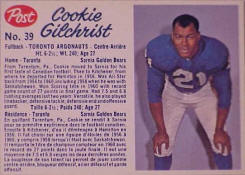 |
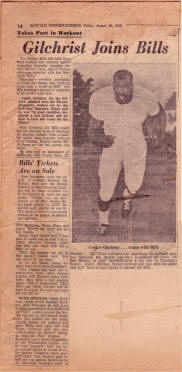 |
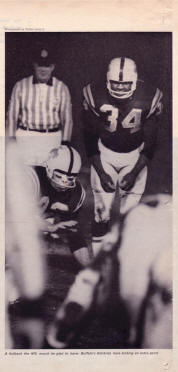 |
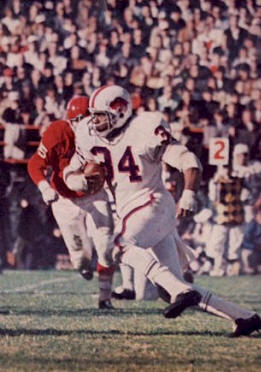 |
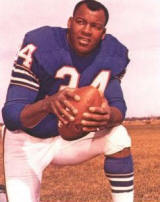 |
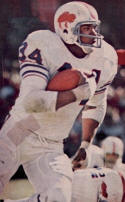 |
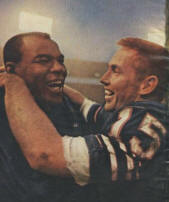 |
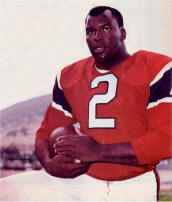 |
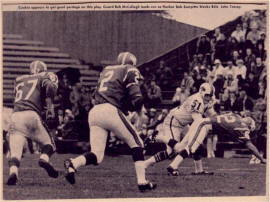 |
. |
|
Chester Carlton 'Cookie' Gilchrist
|
. |
Please click HERE to return to Cookie's main page.
Click HERE to sign a petition to put Cookie Gilchrist on the Bills' Wall of Fame
| Patriots | Bills | Oilers | Jets | Dolphins | Broncos | Chiefs | Chargers | Raiders | Bengals |
